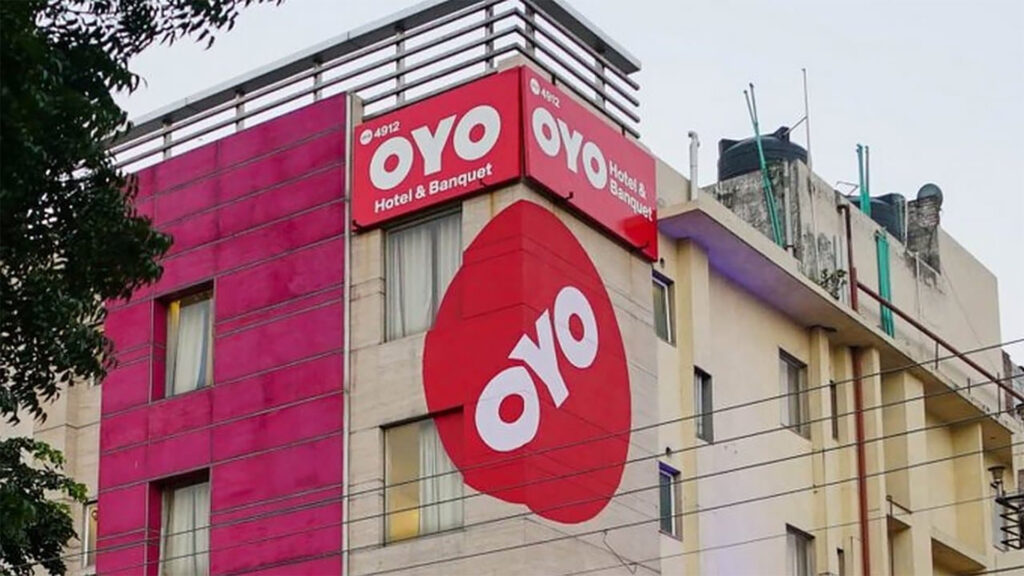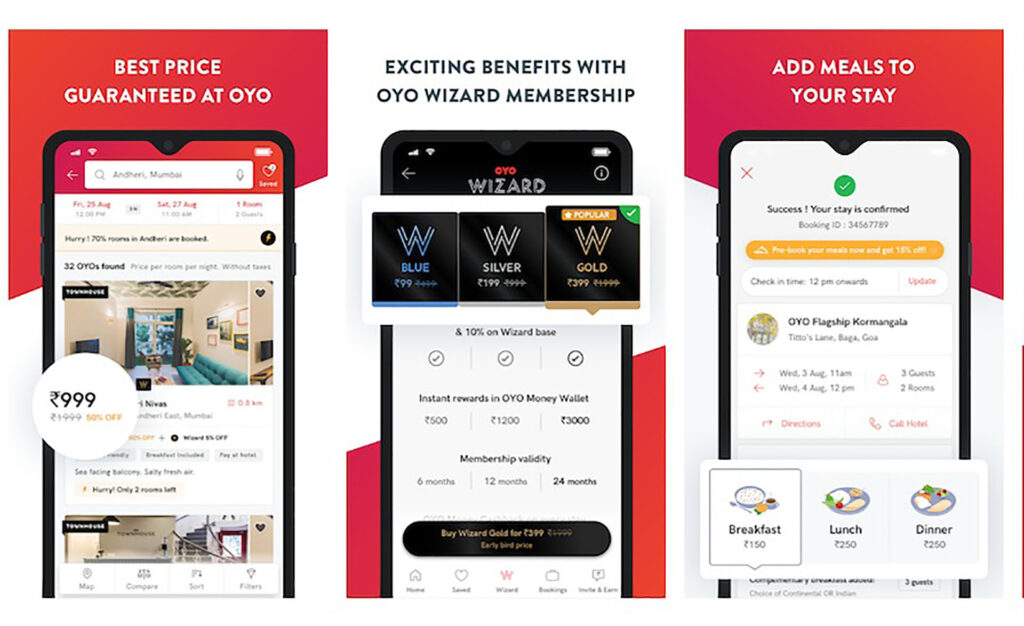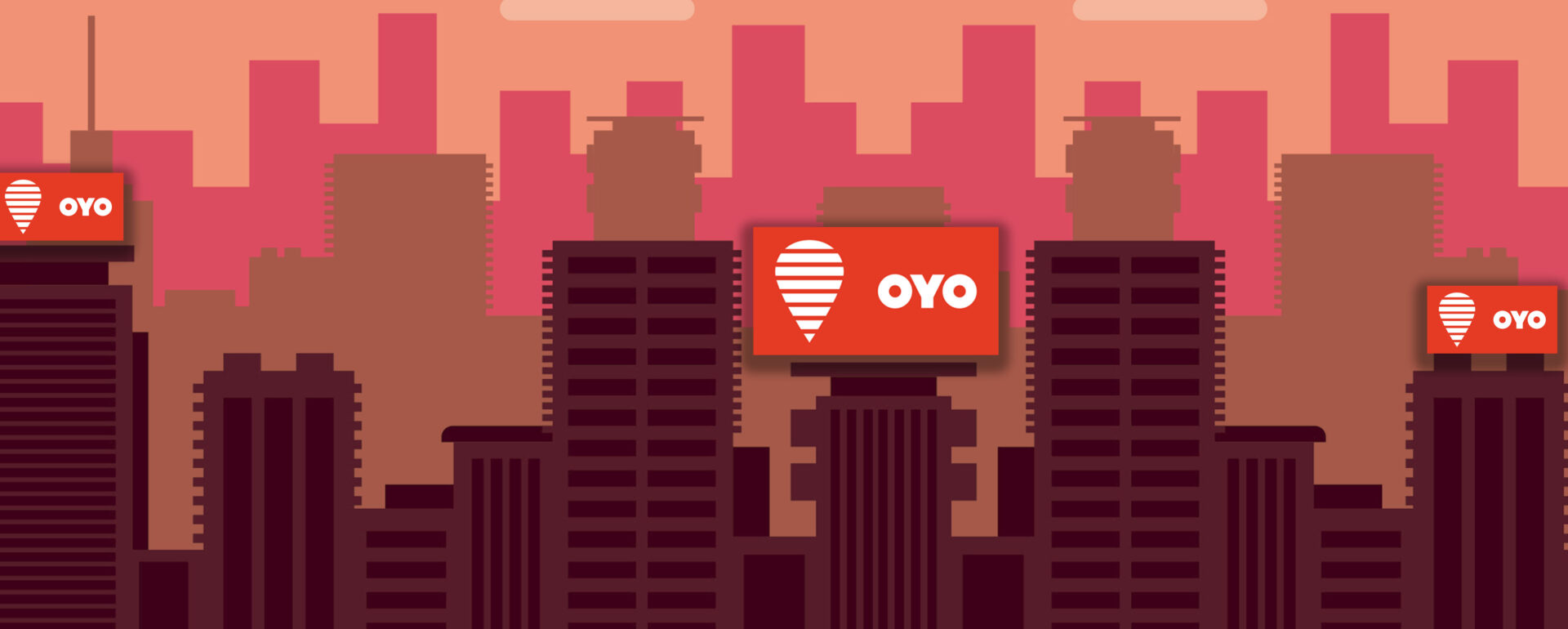At some point or the other, you would have had the desire to just be a tourist, to cut loose and go on a mini-budget vacation across the country. Speaking more to the context of the average Indian citizen, this is easier said than done when you consider the severe lack of infrastructure for the budget traveller. India is a country of two extremes, where on the one hand you have a grand scale of comfort and luxury and live like the one per cent at a hilariously over-expensive price or you stay in a pigeon-hole if you are on a budget. This conundrum is what led the then 18-year-old Ritesh Agarwal to look for a solution, which just so happened to present itself in the brand we have all become familiar with over the years, Oyo Rooms.
The Genesis Of Oyo Rooms
More than a never-before-thought idea, the concept of Oyo Rooms was a solution to a problem. From all his time spent travelling during his college days, Ritesh saw a severe gap in the market for the budget traveller. A gap which took the form of a lack of affordable and good-quality hotels in the unbranded budget hotel sector.
Oyo Rooms was conceived with a very specific goal in mind, to close the gap between the high-end hotels and a limited budget to give the average citizen the best of both worlds. The venture started with Ritesh pioneering a listings and bookings platform for high-quality budget accommodations in 2012 called ‘Oravel Stays’. This was somewhat of a precursor to the now Oyo franchise.
After months of trial and error, it was evident that just providing a means of discovery was not going to bridge that gap. Armed with this new information, the business was pivoted into what we know as Oyo Rooms today.
‘‘
Oyo Rooms brought forth a new age for the travel and hotel industries by bridging the gap between comfort and budget.
The Growth Oyo Rooms Has Seen
What started as a small-scale venture, blossomed into a multi-billion-dollar unicorn. With the backing of around 23 different investors over a period of eight years and a valuation which at its peak stood at $10 billion (according to The Hurun Global Unicorn Report 2020), with $3.2 billion raised in the funding rounds alone, the Indian brand has catapulted itself into the international game. Now Oyo Rooms is the largest branded chain of budget lodges, homes, hotels and rooms in the Asian-Pacific region as it maintains a strong foothold in major countries such as India, China, Malaysia, The United Kingdom, Saudi Arabia, The Philippines, Nepal, UAE (United Arab Emirates), Indonesia and even Japan.
Under the Oyo Rooms brand umbrella, there are over 43,000 plus listings currently active globally in over 80 different countries and an additional 150,000 vacation homes as well. The main reason for Oyo’s rapid expansion is its multi-headed approach in providing a wide range of accommodation to its customer base. The brand offers many products under its purview that vary in levels of luxury and price.

What Makes Oyo Rooms Standout?
At the core of all these sub-categories, however, the most important thing that makes Oyo the king of the industry is standardisation. Regardless of the changing desires of the ever-shifting customer base that is relative to the world of travel, tourism and budget lodgings, Oyo Rooms has maintained a primary focus on the needs of the budget traveller. This is where the standardisation makes the brand stand out. While budget travellers are given a range of options and locations to choose from, they also get value for money. That is to say, every budget room, hotel or motel has to adhere to a set of parameters or guidelines to qualify for the Oyo brand umbrella. These parameters stipulate that there is a basic number of amenities that these lodgings must carry, which include fully functioning WIFI, Air Conditioning, Cable Television, hygienic and well-maintained linens and bed-spreads (especially crucial in the days following the pandemic), hygienic washrooms and a complimentary breakfast.
Whether the client chooses to opt for a room with all or just some of the amenities is up to them as it is entirely dependent on their budget and preferred level of comfort. Hotel owners have displayed a tendency to go the extra mile and invest in this endeavour as this level of standardisation ensures customer satisfaction, which puts their business ahead of the local, non-branded competitors. As a bonus, Oyo rooms delivers on its promise in a consistent manner, which boosts brand confidence further. Since Oyo does not have any physical item or product to speak of, the brand experience and standardisation stands as the product.
Having said that, although Oyo started and maintains the core of its brand as a budget hotel franchise, this brand-is-product strategy has allowed the company to venture into the mid-range budget as well as luxury-stay territory. With expansion not standing as a barrier, Oyo has successfully migrated its expansion efforts into multiple product lines. Let us have a look at some of the main ones:
Oyo Rooms (Also Known as Oyo Hotels)
These are the earlier mentioned budget hotels and motels that offer travellers and tourists the basic amenities such as WIFI, clean rooms, hygienic bathrooms, air conditioning and so on. This branch of products exists all throughout the different countries that Oyo is active in as a baseline of sorts. The unique selling proposition of this line is, as mentioned above, the standardisation across all hotels that are registered under Oyo Rooms to provide customers with that on-brand experience wherever they go.
Oyo Townhouse
These are your mid-range budget hotels and are the brand’s take on a lifestyle hotel. It has gained a lot of popularity with veteran hoteliers as well as new business owners as a way to attract a younger crowd. This branch was specifically structured to attract the millennial crowd as every element of the hotel is geared towards the comfort factor that the millennial crowd has come to expect. Everything from the 24-hours service menu to the sleek and contemporary space, to the booking process, has been streamlined.
SilverKey
SilverKey is synonymous with corporate travel life as this line is oriented for the business traveller. Launched in April of 2018 it is only available in India and as per Oyo’s official blog site, the company plans to undertake an expansion that will see an addition of 8000 plus rooms and 400 properties in around 19 different cities across the country.
SilverKey provides executive-stay accommodations in hotels and rooms that are located in major business hubs and come furnished with spacious rooms, upscale interiors, meals, gym, and dining areas in terms of basic amenities. Additionally, this line of hotels also come equipped with lounging areas and conference rooms along with a complimentary insurance under Acko. Currently, this line of product is active in Gurgaon, Delhi, Noida, Pune, Chennai, Hyderabad, Bangalore, Coimbatore, Trivandrum, and Kolkata.
Capital O
This branch of lodgings is geared towards the high-end customer and can be categorised as a luxury package. Oyo launched this line of luxury rooms in June of 2018 with the target customer being mainly business travellers as Oyo was trying to capture the hearts and minds of the corporate sector. With that said, this line caters to a healthy mix of both business and leisure travellers. This product is also the second-largest line under the brand that operates internationally, after the primary Oyo Rooms that is.
Given how large and full of potential the international business traveller segment is, it only makes sense that the brand went in this direction. This line is very prevalent in India, Southeast Asia, the Middle East, and Latin America specifically.
Collection O
This was the latest iteration of the previous ‘Capital O’ franchise and serves the same function in catering to the corporate traveller. There is no clear distinction between this and the previous version other than the fact that it is only available in India at the moment. Oyo is, however, planning an expansion of this line in Mexico and Indonesia somewhere down the line.
Oyo Homes
This is Oyo’s take on the staycation-oriented traveller. Launched in September 2017, this line was one of Oyo’s first takes on short-term rental spaces, quite similar to its competitors at the time like Airbnb. Private homes can be rented for brief staycations and are only available in India, Indonesia and UAE at the moment.
Oyo Vacation Homes
Primarily focused across the European countries this line of lodgings is less of a sub-category under the Oyo umbrella and more of a stand-alone franchise that really delves into Oyo’s International expansion. Through this, tourists the world over are given the opportunity to rent out vacation homes in Europe.
Oyo Vacation Homes also runs a listings platform as per the founder’s initial vision under the brand ‘Traum-Ferienwohnungen’, which is a subsidiary of Oyo. This brand carries its own share of around 80,000 plus property listings.
Oyo Life
Now, this is a deviation from the common theme of short-term rentals that Oyo has thus far maintained. This line of lodgings is targeted at millennials and young working professionals who are looking for a long-term renting option with end-to-end management. Currently, this product line is active in India and Japan and given Japan’s significant home rental market, the innovative approach to hotel bookings and the host of themed hotels they maintain, this might prove a fruitful venture.

‘‘
Thanks to Oyo's diverse range of hotel lines and its brand management, the Oyo brand has been catapulted into international waters and is dominating the industry.
How Oyo Is Ruling The Industry
It is quite evident why Oyo as a brand and as a product stands above the rest. Yes, it was relatively new to the game and had to compete with international brands like Airbnb, but it had an advantage.
Where Airbnb originated for an American customer demographic, Oyo was designed with Indian travellers in mind. Add to that the fact that India has such a large population and a vast gap in the market for budget hotels that do not meet expectations and you have a winning recipe. The concept of bringing existing hotels and upgrading them to fit the brand image was a brilliant move that ensures customer satisfaction and enables the brand to exponentially expand, which is exactly what Oyo has done.
Ritesh Agarwal, a graduate from the Indian School of Business and Finance, rightly saw a great opportunity in the Indian budget-hotel arena and seized it. What he came up with was more than just a franchising model that succeeded beyond everyone’s expectations. It was rather a democratisation of the traveller’s lifestyle that made it possible for almost anyone, from business moguls to young thrill-seeking college kids, the ability to travel and actually be able to afford a stay at a comfortable and quality-ensured hotel without breaking the bank.
Now, Oyo Rooms is a brand known the world over, with multiple styles of franchised lodgings, a wide spectrum of services, and a good range of price points, all of which are made accessible through one convenient app and a click of the button.
For more inspiring stories like this, do check out our Inspire section!




